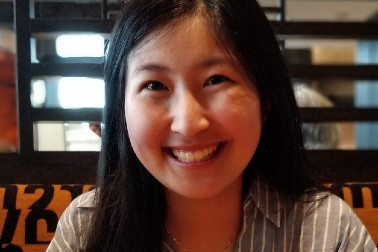
This past summer, we hosted the inaugural World Occupational Science Conference (WOSC), which featured over 100 dialogic, poster, and podium presentations, with keynote addresses by internationally recognized leaders in the field. The success of WOSC would not have been possible without the time and effort of many dedicated volunteers. We sat down with one of them, Master of Occupational Therapy (MOT) student Christine Hsin, to learn more about her experience of the conference and the start of her second year in the MOT program.
What was it like volunteering at WOSC?
Volunteering at the World Occupational Science Conference was an incredible experience. It was very eye opening to see how much work is being done to advance occupational science research from an international standpoint. There were areas that were being researched that I had no idea about and I found that there were many interesting topics, from traditional grain farming practices to cisgender women’s experiences dating. Further, I had the opportunity to meet with other students and researchers from the around the world and talk more about their experiences, passions, and work.
What advice would you give someone who was considering volunteering at a similar conference?
Go for it! Volunteering at a conference is an excellent opportunity to hear more about research and what is happening in the world of occupational science and occupational therapy from people that you might not normally have the chance to interact with. It allows you to appreciate the community of individuals both locally and internationally that are committed to furthering our understanding of occupations, their meaning, and how they can be applied therapeutically. It also raises of awareness of broader societal issues and how to contribute to advocacy and change. Lastly, you’re able to meet other amazing people and network with them to connect if you’re interested in hearing more about their work or collaborating in the future.
How have the first few weeks of your second year in the MOT program compared with the start of your first? What lessons have you carried forward from your first year?
I found that in second year, we jumped right back into doing readings, learning, and having group projects within the first week. In first year, we were given a more general orientation and introduction to topics without having too many assignments or assessments. This allowed us to adjust to a new program and its structure. However, in second year you are better able to manage your time and expectations of the program, so work gets started right away. One lesson that I have carried forward from my first year is learning to look at ahead at due dates and slowly start chipping away at assignments or studying before things start ramping up.
Juggling coursework and fieldwork placements must be difficult at times. What advice would you share with someone who was struggling with this balance?
Think about setting aside some time each week to work through coursework, whether it is for your Capstone research project or writing those T-Res reflections.
After placement each day, give yourself time to rest, debrief, and reflect. It’s just as important to schedule breaks or activities that help you feel restored as much as it is to set time aside to do coursework.
What are you most excited to learn over the coming year?
I am excited to learn more about dysphagia and swallowing and the role of OT in this area. Dysphagia can be common in a variety of OT settings so it will be interesting and important to have a better understanding of how we can work with and support those with this condition.
Would you like to share your experiences as an MOT student or graduate? We’d love to hear from you. Get in touch with us at news.osot@ubc.ca.